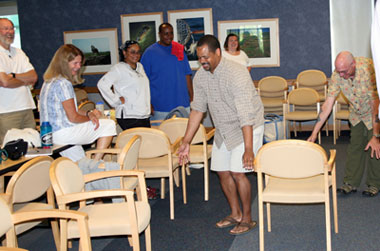Seagrasses are important in keeping the water clean. When suspended particles run into the seagrass, they settle to the bottom. If there is a large, uniform seagrass bed then the particles will settle faster. If there are patches of seagrass, it will take longer to settle. If there is no seagrass, the particles will take a long time to settle.
Objective
This activity will show students how seagrasses are important in settling sediment and other particles suspended in the water.
Materials
- 10-15 chairs
- 3-5 Blindfolds
How to play
Chose three to five students to participate in the first round. Each student must either keep his/her eyes closed or be blindfolded. Clear out a large space in your classroom and place most of the chairs in one general area. Make sure that they are pretty close together. When you say start, these students will walk straight. If they run into a chair, they must sit in it. When all students have either made it through or sat down, the round is over. For the next round, choose new students. This time, after blindfolding the students place small clumps of chairs (3 or 4) in different places. The point is to spread the chairs out to represent small patches of seagrass. Have the students walk through again and when all are done, the round is over. For the final round, blindfold the students and spread very few chairs (2-4) around the area. Have new students walk through and when they are done, the final round is over.
Discussion
After the activity is over, ask the students questions about the difference between each round. Make the connection between the chairs and the seagrass. The students should see that suspended sediment particles settle to the bottom after begin trapped by seagrass. A uniform seagrass bed has the greatest chance of causing the sediment particles to settle.
National Science Education Standards
9-12 A. Science as Inquiry
9-12 C. Life Science
- Interdependence of organisms
- Behavior of organisms